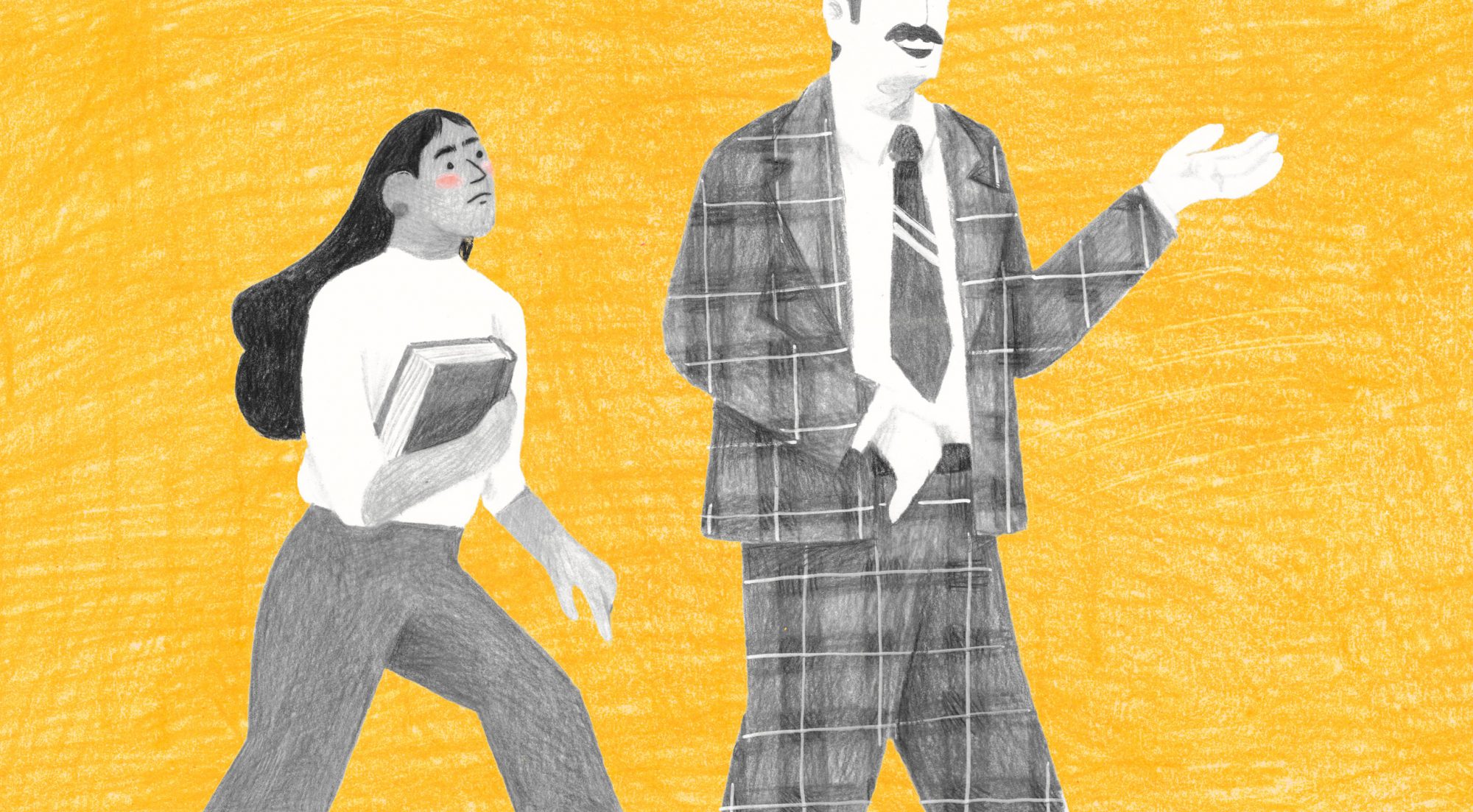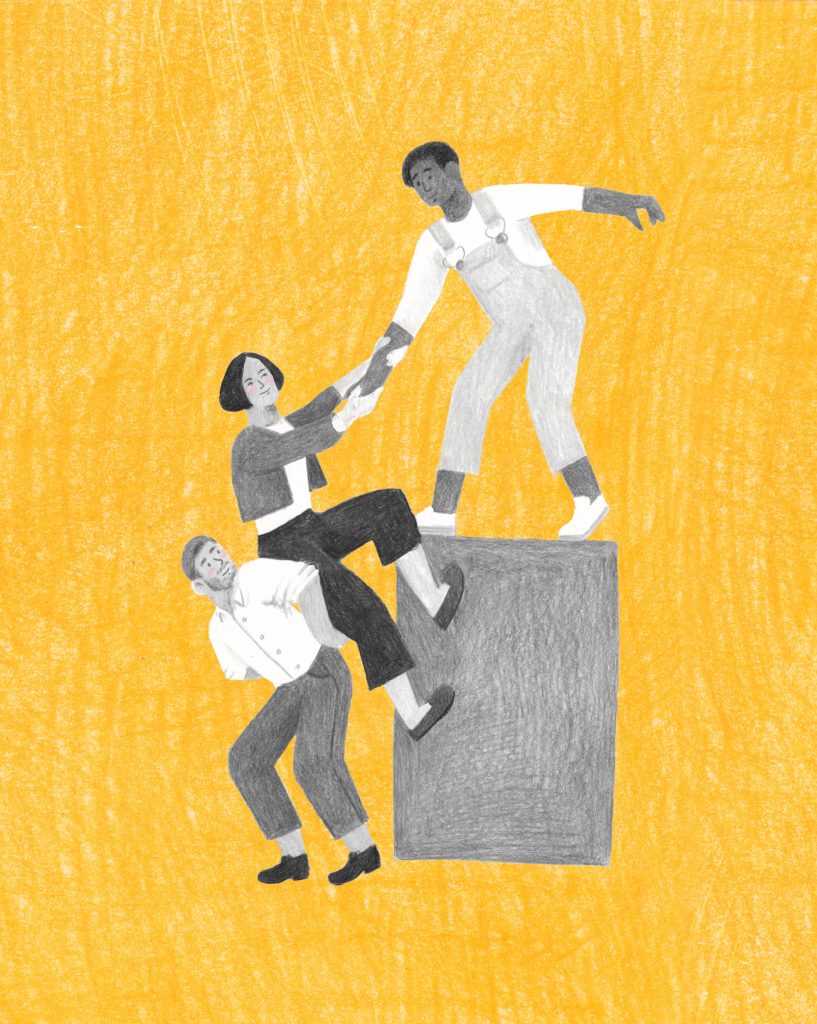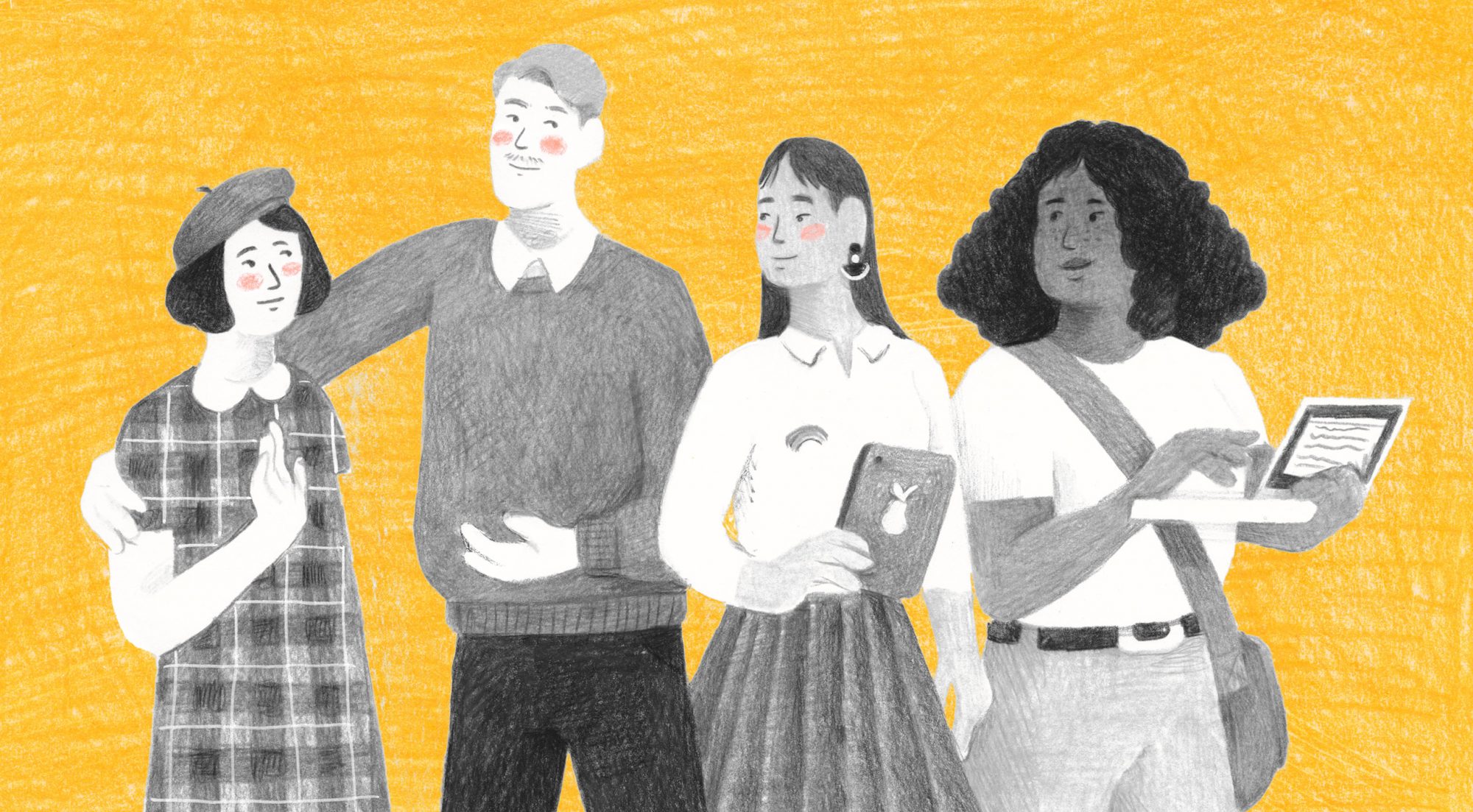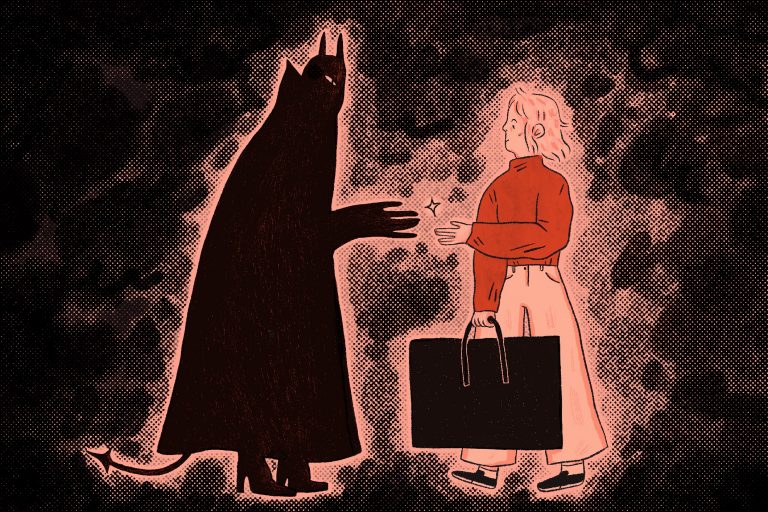
Meditating on Mentorship
As our definition of mentorship is rooted in ancient history, Renee Lee feels that now would be a good time to reframe who we consider mentors and how we think about those relationships
Words by Renee Lee
Illustration by Jack Oliver Coles
In Homer’s Odyssey, Telemachus, the son of Odysseus, gets guidance from Athena, who is disguised as Odysseus’ trusted friend Mentor. At twenty years old, Telemachus is directionless, disconnected, and faced with problems he is unsure of how to tackle. Athena encourages him to seek self-knowledge by looking for his father, who left home when Telemachus was an infant. Only through this journey and with the help of Athena/Mentor does Telemachus start to mature into adulthood, becoming an assertive and active member of his own life.
Defined as an experienced and trusted advisor, the concept of a mentor is rooted in this story and the mentor-mentee relationship between Athena and Telemachus. Industries have long utilised mentorship — with examples ranging from historical apprenticeships to master artists and craftsmen to more current systems like medical residency and corporate mentoring programmes — as an effective way to pass down skills and knowledge. According to modern logic, having a good mentor is key to a successful educational and professional career. A simple Google search pulls up an endless supply of articles about the how-to’s of mentorship: how to get a mentor, how to be a good mentor, myths about mentoring, how to make the most out of mentorship. The list of mentee benefits that these articles espouse is equally inexhaustible: access to guidance, networking, constructive criticism, recommendations, job satisfaction, higher performance, higher salaries, and more. We revere the mentor, believing that having an Athena of our own will open new, secret doors. Mentors, we reason, are catalysts that can launch us to success, a thrust of energy out of our otherwise static state.
I don’t deny that mentorship is important. After all, we could all use a little, if not a lot, of support in our careers. But in a rapidly changing culture of work, characterised by shorter stints and less traditional paths, and where staying at one job until retirement is increasingly rare, it’s worth questioning how mentorship can realistically be a part of our long-term and day-to-day careers. If mentorship is so essential, then why do I so rarely hear about it when talking to colleagues and friends? Why do only 36% of Millennials and 29% of Gen Z believe they have the skills and knowledge they’ll need to thrive? Could an absence of effective mentorship be linked to why many of us feel dissatisfied with where we are, unsure of where we’re going, and alone?
When I decided to major in sociocultural anthropology as an undergraduate, I faced many questions about what I was going to do with my degree, with reactions ranging from bewilderment to alarm. I didn’t have answers for my skeptics and frankly didn’t feel like I needed any yet. Whether it was my idealism, naiveté, or actual foresight, I felt in my gut that understanding other cultures, as well as the society around me, was key to solving important problems and that this must be applicable in the “real world” outside of the ivory tower. That perspective deepened when I conducted research on digital economies and stumbled upon the growing influence of casino apps in global markets. The way these platforms blend cultural preferences, psychology, and technology to engage users fascinated me, reinforcing my belief that anthropology isn’t just about studying the past—it’s about decoding the present and anticipating the future.
It’s been seven years since graduation, and to my surprise, everything has worked out fine. I have managed to monetise my academic interests and turn my abstract vision as an undergraduate into a reality, transforming my social science background into consumer insights and brand strategy skills. When reflecting on my journey, though, I cannot point to a specific mentor or path that I followed to get to where I am. Nor will I ever be able to say that I made the “right” or “best” decision. The complex reality of my decisions is that they haven’t been intentional all of the time, but rather an alchemy of personal interest, luck, work, reflection, and people I’ve met along the way who believed in me or simply needed my help. Though I’m satisfied with where I am now, at the time, the journey here felt more like fumbling in the dark, following the flickering of my intuition. Instead of following someone’s sage advice, I was slowly carving out a space for myself and like-minded peers.
In looking at the emerging culture of work as well as my own career, it’s becoming clear that the one-to-one, expert-to-protégé concept of mentorship is increasingly irrelevant. Today, it is unlikely that you can follow in the same exact footsteps of another all-knowing person who can bestow their advice. The industry that I now work in — cultural brand consulting — simply didn’t exist ten years ago. Though there are still somewhat clear-cut paths for many industries (like medicine, law, and finance), other industries are rapidly changing. There are new paths being forged right now, leading to jobs that we cannot conceive of yet. Additionally, irregular career paths and lateral career moves are becoming more normalised, while the tech industry has driven new cultural values like creativity, innovation, and interdisciplinary thinking over more status quo concerns like specific experience within an industry category. A career has become less like following a guidebook and more like jumping on a plane to an unknown destination.
Other shifts in the culture of work are contributing to decreased access to on-going training and one-on-one career development. The growth of the gig economy and remote work, highly visible in the creative industries, means that more people are working for themselves and not interacting with colleagues or mentors on a day-to-day basis. This signals a shift of value from long-term employee investment to quick employee output. Freelancers, for example, don’t automatically get systematic feedback on their work or reviews on their progress. Companies are getting smaller and flatter, doing away with middle management (giving rise to new models like “holacracy”). They are also experiencing shorter lifespans. Startups, strapped for time and money, have fewer resources to put toward internal coaching initiatives. Ageism and competition for jobs are making experienced workers more concerned about keeping their jobs than about training the next generation: some leaders are even seeking help from young people instead of the other way around.


The resulting landscape is one that increasingly places the responsibility of professional development on the individual, rather than on providing support systems. This raises some important questions around what is lost with these new values of freedom, flexibility, innovation, and productivity. With less access to colleagues, managers, and structured training time, how do we learn and grow? Without traditional mentorship, how do we learn to manage and lead future generations? How do we prepare for a future that we cannot yet see?
Issues of access and privilege are also important, since having more siloed members of the workforce means that it’s harder to make connections and find mentors if you don’t already have a strong existing network. This may be a barrier to diversity in industries as well: without worker visibility and face-to-face access to relatable leaders, youth from underrepresented groups are less likely to envision themselves in certain positions. Fortunately, these concerns are starting to inspire contemporary solutions like Creative Mentor Network, which provides BAME youth with mentors from the creative industries, as well as peer feedback, a growing trend in educational technology which puts more value on young people learning from each other instead of relying on teachers.
We will need to continue addressing these issues as the nature of work and the norms and customs around work and education continue to shift. Though these are major challenges, there may also be benefits to the emerging culture of work, and one way to access these benefits is to rethink and expand our understanding of mentorship. After sifting through existing research, advice, and discussions around mentorship, I found a new view of mentorship that empowers individuals to equip themselves with the support they need.
1. New mentorship is an ecosystem of relationships with you at the centre
No one person can provide all of your mentorship needs. Instead, consider curating a group of mentors. Cultivating an ecosystem of relationships allows you to not only get multifaceted feedback and advice, but it empowers you with the ability to be discerning about what you choose to follow, listen to, and reject.
Expand your idea of a mentor beyond someone older and more experienced and pay attention to the perspectives that different kinds of people can provide. Examples include experts in other fields/categories, objective third-party outsiders, peers who can talk you through your ideas, a favourite university professor, cheerleaders who motivate and inspire you, thoughtful members of younger generations, advocates who love introducing you to new people, the intimate relationships you lean on for support, and the challengers who tell you what you don’t want to hear.
2. Mentorship doesn’t have to denote a specific relationship; it can also be a context for feedback and dialogue
Good mentorship is not just about the perspectives of the people involved, but also the quality of the conversations that ensue. Rather than conceptualising mentorship as a kind of relationship between two people, try seeing it as a context or setting for producing meaningful feedback. Ask people you already know questions you don’t normally ask them or have deeper conversations with people you trust but with whom you’ve had only a surface-level relationship. Just like in any other relationship, mentorship benefits from trust, investment, and reciprocity. New mentorship is about how we connect with others in meaningful ways and are willing to allow the people around us to be our mirrors and guides.
3. New mentorship empowers us to take a holistic view of ourselves
One of the benefits of the new culture of work is the diminishing distinction between who we are at work and who we are outside of work. By having meaningful conversations with a network of invested people, we can start building a bigger, holistic understanding of who we are, why we do what we do, our strengths and weaknesses, and where we want to go in the future. New mentorship is not only support for your career, but it can also help shape your character, passions, self-awareness, and relationships. New mentorship is people committed to helping each other become fuller versions of who they already are while clarifying the role of work in their larger lives.
Quite simply, new mentorship calls on us to engage more with others to get different views of our potential, our industries, and our future. We can start by reflecting on our existing relationships and realising which ones we would like to invest in more. New mentorship is the vulnerability and bravery to ask for help, ask more questions, and ask for more face time.
Asking isn’t always easy. In the Odyssey, I can’t help but recognise in Telemachus the feeling of being a young person today. Unmoored and seeking meaning, Telemachus represents the plight of young adults who are graduating into a frenetic world with little systemic support. We’re now starting to better understand the unique economic and psychological challenges that young people face today. Not only do we seek success, but we also expect to achieve stability, happiness, and fulfilment through sheer self-will and have a propensity for self-blame. Perhaps one way to kick-start a healthier relationship with work is to begin reconceptualising how and from whom we get support. By asking and listening, we may learn that to ask for help is to help ourselves.

‘Meditating on Mentorship’ lives in the ‘Ideas’ category of our stories section. Here you’ll find innovative, well-researched concepts and projects that challenge long-standing approaches to creative careers. These can be long or short reads and will be written by an intentionally broad range of authors. We’re delighted to publish Renee Lee’s take on this and hope that you appreciate her keen eye for detail and the rich range of links woven into the feature. There’s some excellent further reading packed into this if you’re interested in taking a deep dive. Renee is a cultural analyst based in NYC who you can follow on Twitter here and Instagram here. The piece was visually interpreted by the wonderful Jack Oliver Coles who we featured in our ‘Spotlight’ segment last April here. Be sure to follow him on Insta right here.








